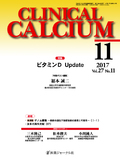Japanese
English
- 有料閲覧
- Abstract 文献概要
- 1ページ目 Look Inside
- 参考文献 Reference
ビタミンDには様々な生理作用が確認されてきているが,最も重要な生理作用は腸管からのカルシウム吸収を促進することである。カルシウムは吸収率の低いミネラルであり,さらに近年カルシウム摂取量も減少している。カルシウム吸収率は高齢者では低下傾向にある。したがって,腸管からのカルシウム吸収率を高めることは重要である。 エルデカルシトールは,腸管からのカルシウム吸収を高め,骨吸収を抑制し,骨密度を高め,骨折を抑制する効果が認められている。エルデカルシトール服用時には,アルファカルシドール服用時に比べ,活性型ビタミンD[1α,25(OH)2D]の血液中濃度は低い。これはエルデカルシトールが腎臓におけるビタミンDの活性化を抑制するからである。したがって,エルデカルシトールの腸管からのカルシウム吸収促進作用は,1α,25(OH)2Dの作用によるものではなく,エルデカルシトール自身の作用によると推定される。
Though various physiological actions have been attributed to vitamin D, its most important function is to promote absorption of calcium from the intestinal tract. While the absorption rate of calcium is generally low, it tends to decline further with age. In addition, calcium intake is decreasing in recent years in Japan. Therefore, it is important to increase the intestinal calcium absorption rate. Eldecalcitol has been shown to increase calcium absorption from the intestinal tract, suppress bone resorption, increase bone mineral density, and prevent fractures. Elocalcitol use leads to a lower systemic active vitamin D[1α,25(OH)2D]concentration, compared to that with alfacalcidol use. This is because eldecalcitol inhibits vitamin D activation in the kidney. Therefore, it is presumed that the calcium absorption-boosting effect of eldecalcitol is not due to the action of 1α, 25(OH)2D, but due to eldecalcitol itself.



